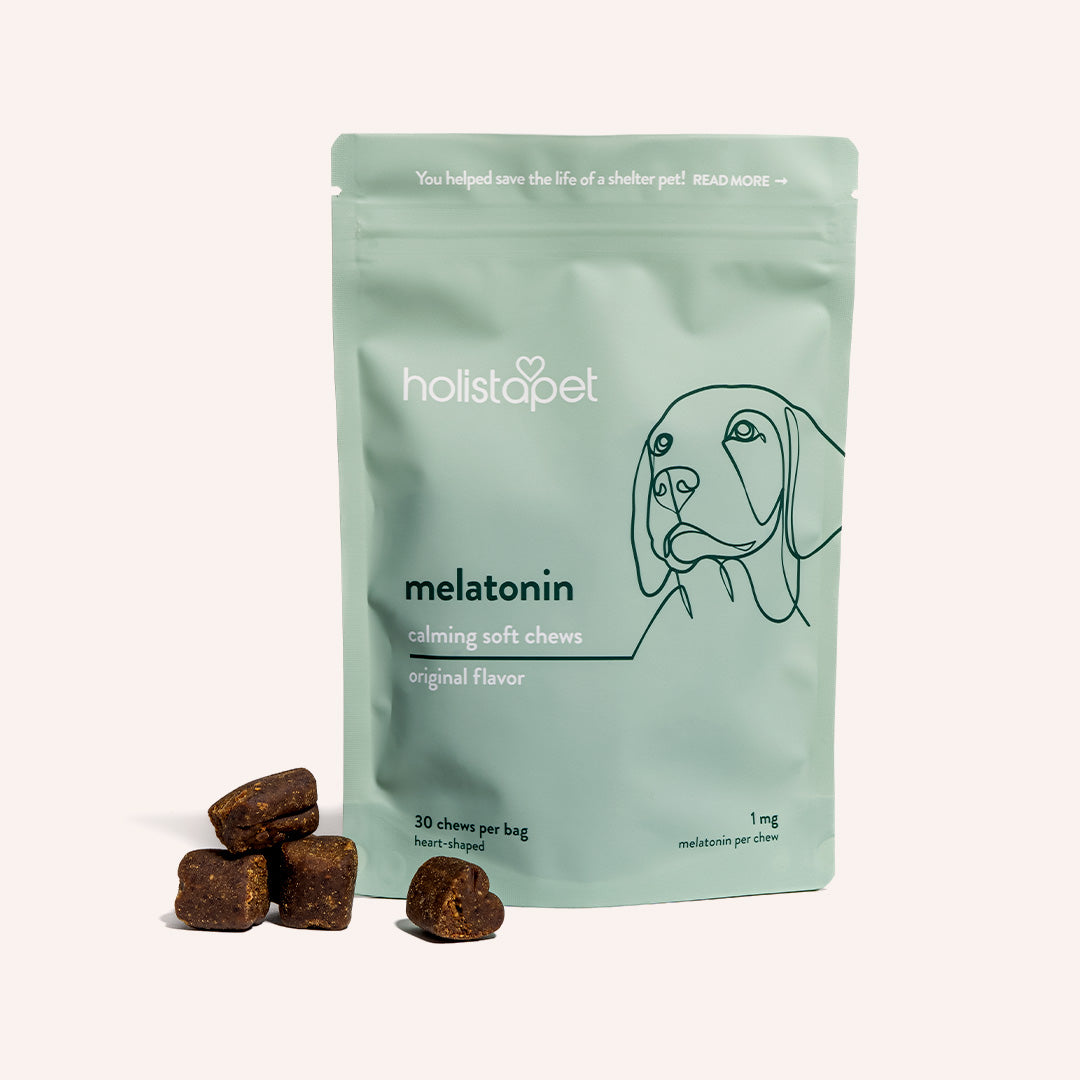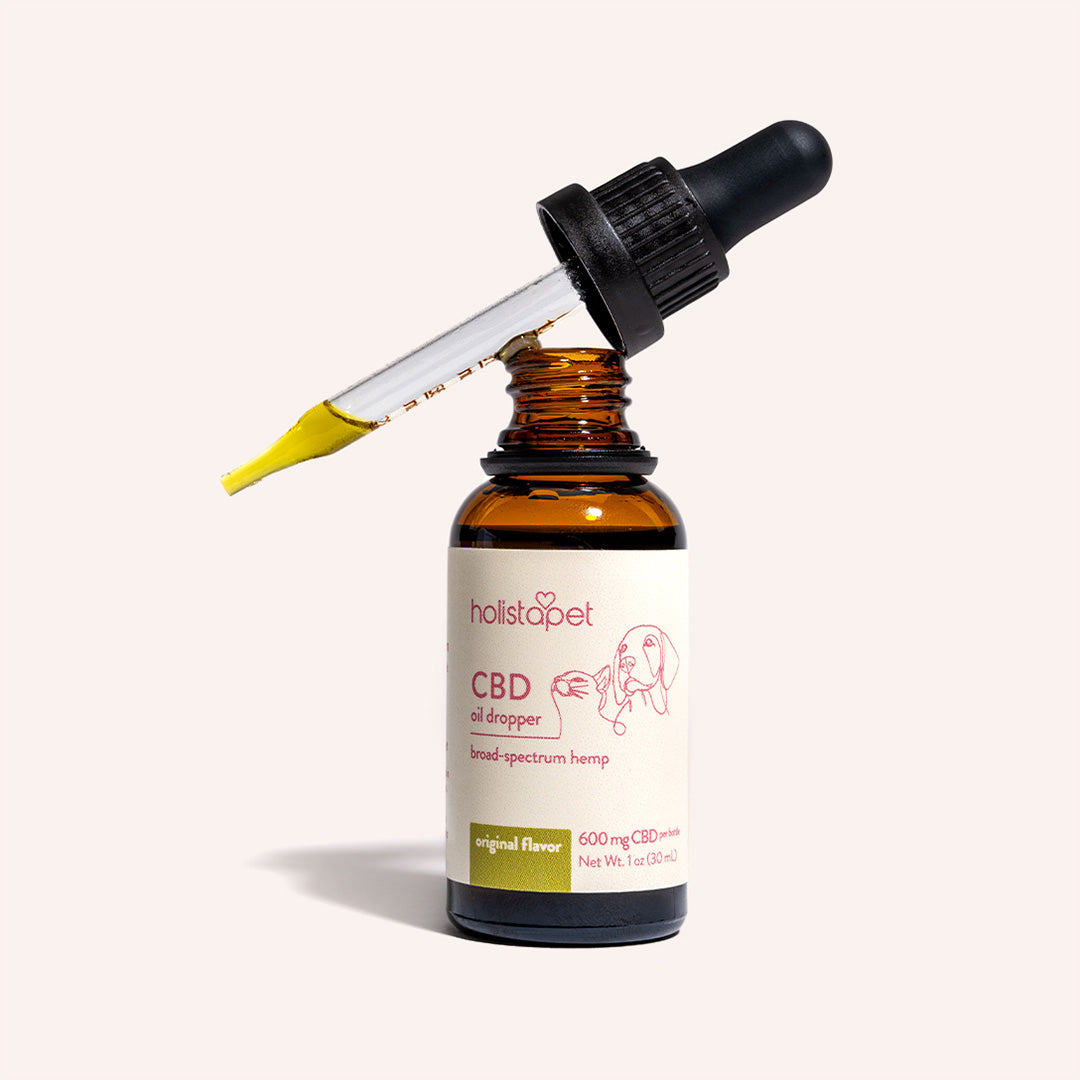You can spot an anxious dog from a mile away. Excessive barking and whining, hiding between their owner's legs, shaking — these are all telltale signs of anxiety. Many people have heard of calming pills for dogs, but do they actually work? While they may provide some relief, there are other natural remedies that can relax your furry friend.
Many dogs experience anxiety at some time in their life, so it's better to be prepared before the issue gets too serious. Believe it or not, there are many different treatment options for anxiety. These aids can come in the form of calming pills to natural, holistic remedies that you can try right at home!
What Causes a Dog to Be Scared or Anxious?
There are several reasons a dog can be scared or anxious, and many are common and preventable. Most of the fears and anxieties that plague a pup fall into one of these three categories:
- General fear: This is fear of anything and everything — loud noises, strangers, new dogs, new places, car rides, etc.
- Separation anxiety: Fear of being left alone and away from the owner; when a dog doesn't stop whining or barking when left in a cage or empty house, that's separation anxiety.
- Old age: As dogs age, their bodies deteriorate, which leads to more health issues. This causes elevated stress and anxiety in older dogs.
Additionally, dogs feed off your energy. Whatever your general attitude is, your dog will be incredibly empathetic towards it. So, if you are scared or anxious, your pooch can sense it. There is some evidence that suggests a connection between owner attitude and dog behavior problems.
Is It Common for Dogs to Be Scared or Anxious?
Yes, it is pretty common for dogs to experience fear or anxiety some time in their life. Even if you have a bold and fearless pup, they often experience more stress as they age. Older dogs may injure themselves, which naturally increases anxiety. Therefore, it isn't uncommon for dogs to become more scared and anxious as they grow older.
Signs Your Dog is Scared or Anxious
Here are some signs your dog is scared or anxious:
- Excessive barking or whining
- Shaking
- Pacing
- Avoiding you and others
- Constantly trying to hide or escape
- Excessive licking
- Changes in body posture and a lowered tail
- Sudden shedding
- Sudden urination or defecation
- Destroying toys, furniture, their dog bed, etc.
How Do You Calm a Dog?
So, your dog is shaking, whining, and all-around just a ball of anxiety. How do you go about calming them down? There isn't a single answer that will work for every dog, but here are some great starting points:
Environmental Changes
If your dog is stressed, move them to a safe space with a comfortable bed, familiar toys, and lots of food, water, and treats. If you observe your dog's behavior, you'll notice that they tend to go to certain places because it's comfortable for them there, so make that their safe space. Also, consider playing calming classical music to settle their nerves.
Stimulation and Exercise
Boredom and lack of exercise can lead to anxiety. If your pup has a ton of pent-up energy it doesn't let out, this can be stressful and lead to undesirable behavior. Make sure to take your dog on regular walks and provide them with a variety of different toys.
Weighted Vest
Also known as compression vests or jackets, these lightly compress and add a little weight to your dog's body to calm them down. It works the same as a weighted blanket; the pressure mimics a light hug and naturally soothes nerves.
Do Calming Pills for Dogs Work?
For more serious cases of anxiety, you may want to consider calming pills. These are prescribed by a veterinarian and should be the last resort if environmental changes and other natural remedies don't work.
Calming pills typically work where other methods of relaxation do not. These medications are usually Selective Serotonin Re-uptake Inhibitors (SSRIs) or anti-depressants, such as fluoxetine (Prozac) and alprazolam (Xanax). If your dog struggles with moderate to severe anxiety, these medications may be what your pup needs for some lasting relief.
Always consult your veterinarian before using calming pills and follow their recommended dosage. As with most medications, there is a risk of side effects, including:
- Sedation
- Loss of appetite
- Vomiting
- Diarrhea
Top Alternatives to Calming Pills for Dogs
If you're not quite ready to put your dog on medication, there are several effective natural remedies that can help.
- Pheromones: Pheromone diffusers and collars are a great natural way to comfort anxious dogs. These items secrete synthetic hormones that mimic the smell of mother dogs, so dogs feel like they're in a comforting presence.
- Calming supplements: There are many calming supplements and treats available that use natural supplements such as valerian root, melatonin, L-theanine (a component found in green tea), and chamomile to ease a stressed-out dog. Be aware that it may take weeks for a dog to see results from these supplements, so these aren't the best for quick relief.
- CBD: CBD, or cannabidiol, is a chemical compound naturally found in hemp that has been known to soothe nervousness and reduce discomfort (more on this later!).
What is the Best Natural Calming Aid for Dogs?
It depends on who you ask, but in general, pheromone products (diffusers, collars, or sprays) can be very effective as a calming aid for dogs.
These products work so well because although the pheromones are synthetic. They are made to mimic the natural scent that mother dogs secrete when they're caring for pups. And if you know anything about dogs, you know that they are very influenced by smell. Just one whiff of a mother's scent may be enough to calm their nerves.
Furthermore, pheromone products do not require your dog to ingest anything, effectively eliminating the chance that your furry friend can have any side effects. Another incredibly beneficial and natural product that can help your dog's peace of mind is cannabidiol (CBD). Let's take a closer look at what CBD can do for your pup.
Can I Use CBD to Help Calm My Dog?
Absolutely! CBD pet products — especially calming pills — are another great way for your dog to calm down. Cannabidiol (CBD) is derived from hemp and is widely available in many pet products. CBD naturally soothes nervous pups and helps ease any discomforts your dog may have. Also, it's very effective in older dogs that are experiencing pain.
Premium organic CBD for dogs works its magic by supporting the endocannabinoid system (ECS) in your dog's body. The ECS is responsible for regulating many important functions in the body, including the nervous system, mood, sleep cycle, brain, and immune system.
What Are the Best CBD Products to Help Calm My Dog?
There are many easy ways for your dog to get a healthy dose of CBD. Some of the best CBD products include:
- CBD Calming Chews for Dogs: These irresistible little treats are not only full of flavor (peanut butter!), but they are an easy way to give your dog a specific dose of CBD.
- CBD Oil for Dogs: If your dog needs anxiety relief quickly, CBD oil is the way to go. Add some to their food or drip it directly into their mouth, and within minutes your dog will calm down.
Final Thoughts - Calming Pills for Dogs
An anxious pup is not a happy pup. Luckily, you can find plenty of calming options for your dog if it gets too nervous. It can be as easy as providing them a safe space or giving them enough exercise. In more serious cases, it can mean CBD treats or calming pills.
Whatever your dog's situation is, there is a solution — all it takes is some understanding and knowledge of what options you have. Then, your dog can go back to being its best self!








![Probiotics For Dogs [Soft Chews]](http://www.holistapet.com/cdn/shop/files/Probiotic-Infographic-1_472d7a29-e30c-435a-9638-1365d8c3a9f9.jpg?v=1725384841&width=104)















![Calming Pills for Dogs [Do They Work + Alternatives]](http://www.holistapet.com/cdn/shop/articles/302.jpg?v=1715280010&width=1500)
![What Can I Give My Dog for an Upset Stomach [Best At-Home Tricks]](http://www.holistapet.com/cdn/shop/articles/309.jpg?v=1715280280&width=500)
![Joint Care for Dogs [How To Identify Issues & Ways To Help]](http://www.holistapet.com/cdn/shop/articles/299.jpg?v=1715279915&width=500)












Leave a comment
This site is protected by hCaptcha and the hCaptcha Privacy Policy and Terms of Service apply.